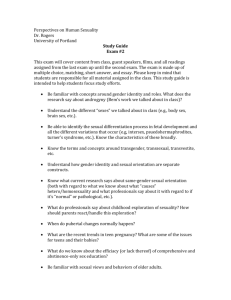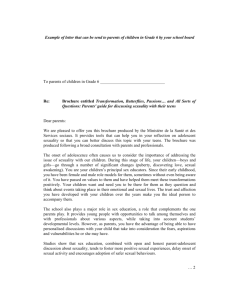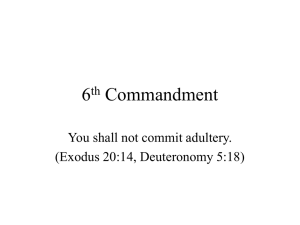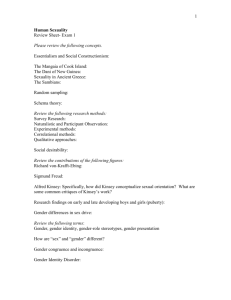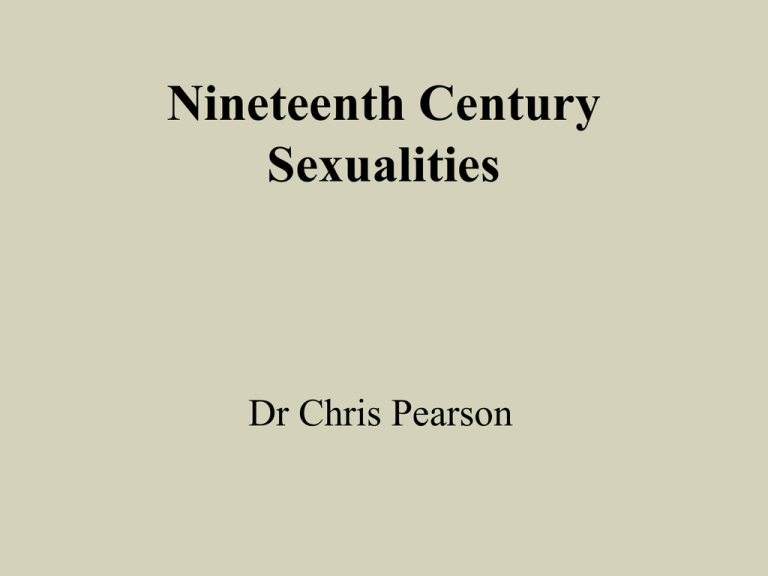
Nineteenth Century
Sexualities
Dr Chris Pearson
Colette (1873-1954)
Colette’s wedding night:
‘The husband, tight and graceless,
undertook his assault on the nuptial
bed, his face illuminated by excessive
appetites. He stank of stale cigar and
liqueur, and as he claimed his due he
showed all the gallantry of a sailor on
shore leave.’
History and Sexuality
• Michel Foucault’s The History of
Sexuality (1976-1984)
• Attitudes towards sex and sexual
behaviour have histories linked to
wider power relations
• Difficult for social historians to
research this intensely private subject
Lecture themes
• Attempts by doctors and other
“experts” to police and control
sexual behaviour
• Changes and continuities vis-à-vis
attitudes towards sexuality
Lecture outline
• Female sexuality
• Male sexuality
• Policing homosexuality
Female sexuality and the
enlightenment
• New medical opinions on female sexuality
• Female identity and sexuality determined by
sexual organs and reproductive functions
• Biological determinism: women naturally
submissive
• Women’s sexual organs made them
irrational and emotional
Jean-Jacques
Rousseau:
Critic of salon
women
Madame du Berry
MarieAntoinette
The revolution and female
sexuality
• Revolutionaries influenced heavily by
Enlightenment theories and supposed link
between female sexuality and political
corruption during the enlightenment
• Revolutionaries stated that women should
withdraw from the public sphere and be
good mothers
The Merveilleuses during the
Thermidorian period
Civil Code (1804)
• Married women had to submit to their
husband’s will
• Wives the property of their husbands
• The “Double Standard” vis-à-vis
adultery; wives could be imprisoned,
husbands could play around with
impunity
• Civil code banned paternity suits
‘It was in a prostitute’s bed that most
sons of the lower and, to an even
greater extent middle class, had their
first sexual experiences.’
Alain Corbin, Women for Hire
(1990), 61
Poet Paul Verlaine remembers
his first time:
‘The smoke of the cigarettes of women and
of the cigars of a few men staying late…
created a heavy atmosphere through which I
nonetheless discerned a beauty… who
seemed to me to be presentable and
passable, though in reality she was probably
neither. But I was at the age of illusions…’
Regulating Prostitution
• Prostitutes required to register, carry card,
undergo physical examinations
• Police des moeurs (bureau of morality)
granted licences to brothels or maisons de
tolérance (brothels)
• Prostitution legal and state regulated
• Punishments for those women who didn’t
comply
Prostitutes as symbols of
dangerous female sexuality
• Symbolized laziness, agitation (frequently
changing addresses and lovers), excess, and
disorder
• Threat of prostitutes becoming lesbians – a
threat to social order
• Views expressed in Parent-Duchâtelet’s De
la prostitution dans la ville de Paris (1838)
Manet’s Olympia (1865)
Toulouse-Lautrec, In the Salon at the Rue des Moulins, 1894
Barthélemy Prosper Enfantin (1796-1864)
‘Until now coquettishness, frivolity, fickleness,
beauty and gracefulness have given rise only to
guile, trickery, hypocrisy, adultery etc., because
society has not been able to regulate, or satisfy,
or use [these] human qualities. They have
therefore become sources of disorder, instead of
being as they should be, sources of joy and
happiness.’
Enfantin, quoted in Goldberg Moses, French
Feminism (1984), p. 47
Claire Démar on the importance
of sex before marriage:
‘It happens often that, on the threshold of
the bedroom, a devouring flame dies. For
more than one great passion, the perfumed
bed sheets have become a death shroud;
perhaps more than one women who will
read these lines, came to the marriage-bed
throbbing with feeling and desire only to get
up in the morning frigid and icy.’
Greater sexual freedom from 1880s+?
• Increased recognition that women’s sexual
desires should be met within marriage
• Tolerance of gossip and sexual intrigue, as
long as outward image of respectability was
maintained
• Female adultery tolerated in certain circles
e.g. Magdeleine Decori
• M. Plott, ‘The Rules of the Game,’ French
Historical Studies, (2002)
Bourgeois male sexualities
• Importance of the formerly aristocratic
‘honour code’
• Desperate to ensure that their wealth would
be passed on to a healthy hier
• Led them to ‘valorize genital, reproductive,
and marital sexual behaviour over
“pathological” and sterile kinds’
• Nye, Masculinity and Male Codes of Honor,
p.45
The ideal couple is that ‘of the most female
woman and the most virile man, when a
dark, hairy, dry, hot and impetuous male
finds the other sex delicate, moist, smooth
and white, timid and modest…. [The
woman] through [her] timidity [must] be
ready to welcome, to absorb, out of need
and a feeling of deficit, the overflow of the
other in order to establish equality and
reach fullness.’
J-J Virey, De la femme (1825)
The dangers of male sexual excess
These exhausted men ‘dress themselves in
the skirts of an eunuch or in effeminate
clothing... they tremble with fear at the very
sight of weapons; they cannot think or act as
men should do; they are the most scornful
and vile beings in creation; their cowardice
and their impotence obliges them to deal in
falsehoods and duplicity.’
J.J. Virey, De la femme (1825)
Prevalent ideas on male sexuality
• Juste milieu - moderation in sex, as in
all other things
• Male and female fundamentally
different but interdependent
• Procreation within the family
encouraged
The dangers of
masturbation,
according to the
Livre sans titre
(1830)
Some more medical views on sex:
• Contraception would lead to sexual excess
and then on to individual and national
decline
• Men needed to preserve seminal fluid to
guarantee social order and national vitality
• Impotence an affront to male vigour and
honour
Doctors on homosexuality
• Doctors pathologized homosexuality,
in part because it did not include
reproductive sex
• Medical experts viewed homosexuals
as physically inferior to heterosexual
men and morally perverted –
‘incomplete men and failed women’
‘The milieus in which we live are
enervating; the air we breathe is charged
with desires that stimulate our senses and
create for us imperious needs that we
neither want nor know how to struggle
against. Pleasure is our only thought,
enjoyment our supreme goal.’
Quoted in C Forth, The Dreyfus Affair and the
Crisis of French Manhood (2004), 118
Policing homosexuality
• “Sodomy” decriminalized during the
Revolution (1791)
• Since then, homosexuality has never been
illegal in France
• But continual police surveillance of samesex activity throughout nineteenth century
France
The supposed links between
homosexuality and criminality
‘It is from the pederasts that the most skilful
and audacious criminals come… They
practice indiscriminately swindling, theft, and
murder; but blackmail is their favourite
weapon.’
Gustave Macé, head of the Paris detective
service from 1879, quoted in Jackson, Living
in Arcadia, 21
“Public indecency”
• Paris police force investigated 1,800
individuals for same sex activity between
1873 and 1879
• Homosexuality legal so police used article
330 of the penal code against “public
indecency”
• Two year (max) prison sentence
• 93% conviction rate in 1870s Paris
The Palais Royal
‘How can it be that… in a city like Paris
every evening among the strollers in the
Galerie d’Orléans [at the] Palais Royal,
you let a troop… of young boys from
eighteen to twenty, all in cap and smock…
carry on a trade… that rejects all morals?
These are male whores who sell
themselves to the inhabitants of Sodom
and do so publicly. How can you let this
disgusting traffic go on every evening?’
Anonymous Parisian to Paris Prefect (1839), quoted in Sibalis,
‘The Palias-Royal and the Homosexual Subculture of
Nineteenth-Century France,’ Journal of Homosexuality 41
(2002), 122
Toulouse-Lautrec, The Bed, c.1892
Toulouse-Lautrec, Au
Hanneton (1898)
Toulouse Lautrec, A la Souris
(1897)





